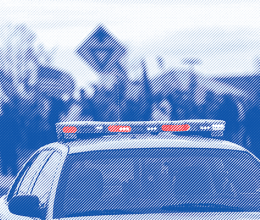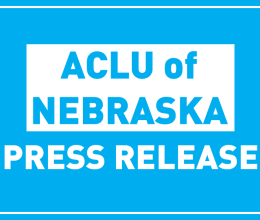
This blog originially appeared in the Omaha World Herald on Monday, October 6, 2014.
Law enforcement officers have an incredibly important role in our communities. Yet too many in Omaha don't have the trust in our law enforcement officers needed to keep our communities safe.
During the month of August, the ACLU released three reports related to areas where the Omaha Police Department has failed to follow guidelines from the Department of Justice and other experts: complaint procedures, use of Tasers and racial profiling during traffic stops.
While ACLU Nebraska has provided a variety of recommendations to Nebraska law enforcement agencies on the subject, there is one recommendation that we believe will do the most to protect public safety, build trust between law enforcement and the community, and use taxpayer dollars wisely: mandate the use of body-worn cameras for all Omaha police officers.
You shouldn't just take the word of the ACLU, though. A recent report from the Department of Justice's Community Oriented Policing Services (COPS) says: "Departments that are already deploying body-worn cameras tell us that the presence of cameras often improves performance of officers as well as the conduct of the community members."
Police chiefs themselves are expressing their support for body-worn camera programs:
- "Everyone is on their best behavior when the cameras are running. The officers, the public ó everyone" ó Ron Miller, chief of police, Topeka Police Department.
- "We also know that the overwhelming majority of our officers are out there doing a very good job, and the camera will show just that" ó Douglas Gillespie, sheriff, Las Vegas Metropolitan Police Department.
- "Although body-worn cameras are just one tool, the quality of information that they can capture is unsurpassed. With sound policy and guidance, their evidentiary value definitely outweighs any drawbacks or concerns" ñ Jason Parker, chief of police, Dalton (Georgia) Police Department.
The ACLU is often not the one to speak out in favor of government cameras. We've worked with the Lincoln Police Department to craft policies for cameras in a high-crime area that balance public safety and privacy. In Florida, we've cautioned against expanding these cameras beyond law enforcement. The recommendations from the COPS report released this year echo many of the ACLU concerns in a 2013 white paper ("Police Body-Mounted Cameras: With Right Policies in Place, a Win for All"):
"For the [American Civil Liberties Union], the challenge of on-officer cameras is the tension between their potential to invade privacy and their strong benefit in promoting police accountability. Overall, we think they can be a win-win ó but only if they are deployed within a framework of strong policies to ensure they protect the public without becoming yet another system for routine surveillance of the public, and maintain public confidence in the integrity of those privacy protections. Without such a framework, their accountability benefits would not exceed their privacy risks."
The bottom line: There are ways to use body-worn cameras to protect public safety and ensure privacy rights are protected.
These cameras are a much better way to protect public safety than increased militarization. The City of San Jose, California, recently decided to get rid of the MRAP vehicle similar to the ones some Nebraska law enforcement agencies now have. The reason, according to San Jose Sgt. Heather Randol: "We realize it could be viewed by the community as the militarization of the [San Jose Police Department]. It could create a divide, and we want the community's trust."
If an officer is in the right, he or she shouldn't have to rely upon footage from a bystander's cellphone, or a gas station camera, or, as we recently saw in Omaha, a television show camera to prove his or her innocence. Conversely, when an officer betrays the trust of the community and abuses power, our law enforcement agencies should be able to hold that officer accountable.
We want people in Omaha to be able to trust law enforcement. Community trust improves public safety, helps crimes get solved faster and ultimately saves taxpayer dollars.
There are many steps the Omaha Police Department needs to take to build trust and become accountable to the community. The department should join the growing number of agencies using body-worn cameras and implement them according to the recently released guidelines from the Department of Justice.



